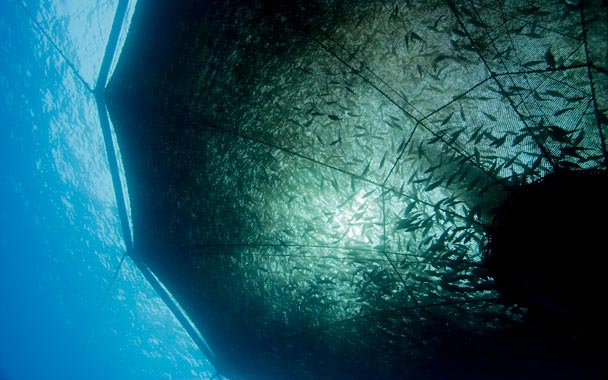By resorting to benign (some might say cynical) neglect, the Obama administration last week succeeded in opening the Gulf of Mexico to unregulated, industrial-scale, open-water fish farms.
That was a goal that twice eluded President Bush and the National Oceanic and Atmospheric Administration (NOAA), the federal agency that regulates off-shore fish farming—in no small part because the practice was vehemently opposed by a wide-ranging consortium of marine scientists, fishermen, and conservation groups, including Food and Water Watch, the Center for Food Safety, and the Institute for Fisheries Resources. As these opponents have pointed out, off-shore fish farms (which are huge net pens suspended below the surface) have many of the same problems as their inshore counterparts, including the discharge of untreated sewage, pesticides, and antibiotics directly into the water; the likelihood of escapes of non-native species; and the introduction of disease and parasites to wild populations. Because of these threats to wild fish, Congress rebuffed NOAA’s efforts to open the Gulf for aquaculture during the Bush years.
But the agency has since managed to sneak in through the back door: In January, the Gulf of Mexico Fisheries Management Council, which is charged by the federal government to oversee fisheries in the Gulf, presented NOAA with a plan that allowed for off-shore aquaculture. The plan was unpopular for the same reasons as the thwarted legislation—but a loophole in the law says that if NOAA fails to act on a fisheries-management plan by a set deadline, then the plan automatically goes into effect. That deadline passed earlier this month.
Even though a recently released study shows that aquaculture now accounts for half of the fish humans consume, high-value carnivorous species like those typically raised in net pens also must be fed several pounds of wild fish to produce a pound of farmed fish, an unsustainable practice.
As Marianne Cufone of Food and Water Watch said, “It’s unacceptable that the very agency (NOAA) primarily tasked with managing and protecting our wild fish resources is almost blindly pushing open ocean aquaculture. NOAA’s priority should be to first do no harm to our ocean, fish, and the people and wildlife that rely on them.”
“The agency’s silence is a choice in itself: to allow development of what are essentially factory farms of the sea—dirty, crowded mass-production facilities that can harm the environment and produce lower-quality fish for consumers,” said Cufone in a statement. “In addition to the overwhelming public opposition to this plan, its legality is highly questionable.”
One can only hope she’s right.




 Pinterest
Pinterest


